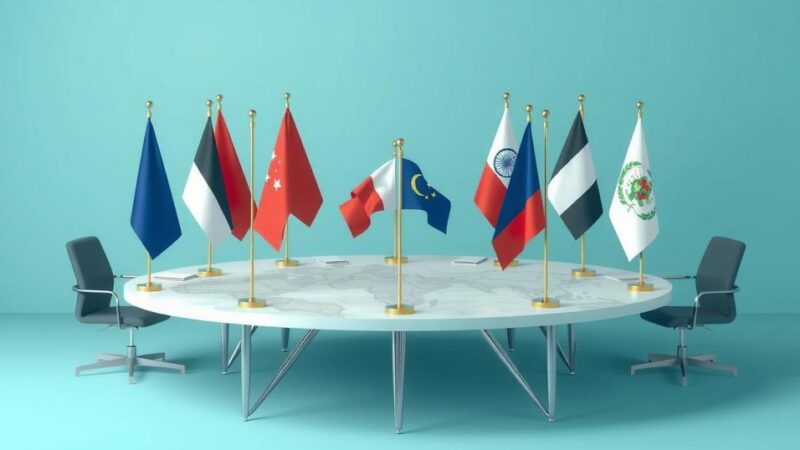South Sudan is on the brink of renewed conflict as tensions rise between political factions, especially following a militia’s capture of an army base in Nasir. The fragile peace established by the 2018 agreement is threatened by economic difficulties and the ongoing war in Sudan. Urgent intervention by regional leaders is essential to prevent the escalation into full-scale war and humanitarian crises.
South Sudan is perilously approaching the brink of renewed war and political unrest. On March 4, a militia aligned with Riek Machar, the first vice president and former rebel leader, seized an army base in Nasir, a significant town near the South Sudan-Ethiopia border. Machar accuses President Salva Kiir’s army of launching attacks against his forces in Ulang county on February 25, heightening tensions in Juba. The arrests of several of Machar’s key allies by Kiir threaten the fragile unity government established by the 2018 peace agreement that concluded five years of civil war. With escalating violence anticipated in Upper Nile, the situation risks exacerbating conflicts across national borders, potentially embroiling Sudan as well.
The tenuous 2018 agreement between Kiir and Machar did prevent large-scale confrontations thus far, but violence frequently erupts at local levels due to factors beyond their rivalry. The ongoing civil war in Sudan has significantly destabilized South Sudan, causing a substantial loss in state revenue due to disruptions in oil exports after a pipeline burst in Khartoum during fighting in 2024. Furthermore, economic challenges have plunged Kiir’s administration into a fiscal crisis, compromising his ability to sustain patronage networks essential for his regime’s survival. Public discontent has surged as a result.
Amid these pressures, Kiir is challenged to maintain relations with the Sudanese military under General Abdel Fattah al-Burhan and the paramilitary Rapid Support Forces (RSF) led by General Hemedti. Initially, Kiir appeared to favor Burhan as the war unfolded, partly because the oil pipeline terminates in Port Sudan, a key area for the military’s operations. However, the pipeline also traverses regions controlled by the RSF, complicating repairs and negotiations for continued oil flow, which are essential for Kiir’s governance.
Recent dialogues suggest Kiir’s administration has become more aligned with the RSF and the United Arab Emirates, which supports the rebels. Conversely, the relationship between Juba and Burhan’s government has deteriorated, particularly following a new alliance between the RSF and the Sudan People’s Liberation Movement-North (SPLM-North), a group backed by Juba.
Fears of violence spillover from Sudan’s conflict into South Sudan are mounting, especially in Upper Nile, where ethno-political divisions could reignite past horrors. Many believe the Sudanese military has rekindled ties with the Nuer militias in Upper Nile, potentially sending military supplies that could catalyze the ongoing confrontations. Analysts indicate that Burhan’s possible objective is to reinstate control over territories along the border.
The ongoing violence could escalate, leading the Nuer militias to target Malakal, a strategic city in Upper Nile. Such a conflict could produce disastrous communal violence and widen the unrest throughout South Sudan. The South Sudanese army may also retaliate by attempting to reclaim control over Nasir. As hostilities commence, Machar’s ability to exert influence over the militia is uncertain, given the complexity of local alliances amid shifting loyalties.
Currently, conflict is widespread in Upper Nile, placing key political figures at risk in Juba. Machar’s physical security is compromised due to his current protection status by Kiir’s forces. Recent fatalities among military leaders have heightened apprehensions, suggesting the potential for brutal reprisals against civilians and allies.
Kiir is likely to exploit rising tensions to bolster support from his Dinka constituency, especially following staffing shifts among his leadership. Amid overall political instability, rumors of deteriorating health condition have compounded the pressures on Kiir’s already fragile hold on power, exacerbating competition among potential successors.
The potential collapse of the regime and the 2018 agreement pose severe threats to South Sudan’s stability, risking catastrophic humanitarian and ethnic violence. It could also transform the region into a battleground for various militias and further entwine South Sudan in the ongoing conflict in Sudan. This escalation could unleash a torrent of violence across borders, making diplomatic intervention urgently critical.
To avert a humanitarian disaster, regional leaders must act decisively to de-escalate tensions. Recent discussions led by Kenyan President William Ruto with Kiir and Machar illustrate a glimmer of hope for stabilizing the situation. Moreover, collaboration with influential figures such as South African President Cyril Ramaphosa and Ethiopian Prime Minister Abiy Ahmed could bolster mediation efforts. The United Nations, through its peacekeeping operations, stands ready to assist in diplomatic resolutions, stressing the need for rapid response measures to protect civilians in case of renewed violence. Only through swift and decisive diplomacy may South Sudan avoid plunging back into chaos and bloodshed.
In conclusion, South Sudan is on the verge of renewed conflict amid rising tensions between political factions, exacerbated by the ongoing war in neighboring Sudan. The fragile peace established by the 2018 agreement is increasingly threatened by localized violence and economic turmoil. Regional leaders must act without delay to prevent a descent into full-scale war and further humanitarian crises, underscoring the need for proactive diplomatic engagement to stabilize the region before it spirals out of control.
Original Source: www.pmldaily.com






